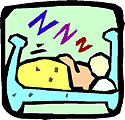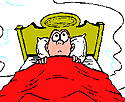Neuroscience For Kids
Disney Dreaming: Sleep Disorders in Film
 February 28, 2008
February 28, 2008
Writers of Disney animated films have had a sharp eye on their sleeping pets. A new study published in the journal Sleep Medicine describes how Disney cartoons included characters with sleep disorders.
Rapid Eye Movement (REM) Sleep Behavior Disorder (RBD)
Most dreams occur during the REM stage of sleep. During REM sleep, the
brain sends messages to the body to paralyze muscles so we can't move.
However, in animals with RBD, these messages are interrupted and dreams
are acted out. The symptoms of RBD, including facial twitching, movement,
and grunting, can be seen in four Disney dogs:

- Bruno (in Cinderella)
- Trusty (in Lady and the Tramp)
- Chief (in The Fox and the Hound)
- Pluto (in Pluto's Judgment Day)
Nightmares
Nightmares are especially frightening dreams and can cause strong
emotional reactions. In Disney films, nightmares affected:
![]()
- Mickey Mouse (in Mickey's Nightmare)
- Mickey Mouse (in The Mad Doctor)
- Mickey Mouse (in Thru the Looking Glass)
Sleepwalking
Sleepwalking can be as simple as getting out of bed and walking around or more complicated such as driving a car. Sleepwalking usually does not occur when someone is dreaming (REM sleep). Rather, this sleep disorder usually occurs during non-REM sleep stages. Sleepwalking can be seen in:
- Pluto (in The Sleepwalker)
- Monte the Pelican (in The Pelican and the Snipe)
- Donald Duck (in Sleepy Time Donald)
Sleep-Related Epilepsy
Sleep-related epilepsy occurs in people who have seizures only when they are asleep. This disorder can be seen in
- Dopey (in Snow White and the Seven Dwarfs)
Loud Snoring
Several Disney characters snore loudly while they sleep:

- Sleepy, Doc, Happy, Sneezy and Dopey (in Snow White and the Seven Dwarfs)
- Humphrey the Grizzly Bear (in Bearly Asleep)
- Gepetto (in Pinocchio)
Excessive Daytime Sleepiness
Excessive daytime sleepiness is a sleep disorder where people feel very tired and drowsy during the day. They often have trouble staying awake and feel that they must take a nap. Disney characters with some symptoms of excessive daytime sleepiness include:
- Sleepy (in Snow White and the Seven Dwarfs)
- Aurora (in Sleeping Beauty)
- Snow White (in Snow White and the Seven Dwarfs)
- Archimedes, the owl (in The Sword in the Stone)
Insomnia and Circadian Rhythm Sleep Disorder
People sometimes have a difficult time going to sleep and two Disney
characters in three films show this problem:

- Donald Duck (in Early to Bed)
- Donald Duck (in Drip Dippy Donald)
- Goofy (in How to Sleep)
The portrayal of various sleep disorders in these early Disney films is especially interesting because many of these movies were created before basic information about the nature of sleep was known. For example, Cinderella, Pluto's Judgment Day, Snow White and the Seven Dwarfs and other these Disney films were released before the discovery of REM sleep!
References and further information:
- Iranzo, A., Schenck, C., and Fonte, J., REM sleep behavior disorder and other sleep disturbances in Disney animated films, Sleep Medicine, 8:531-536, 2007.
- REM Behavior Disorder - from the Sleep Channel
- REM Behavior Disorder - from eMedicine
- Sleep - from Neuroscience for Kids
Copyright © 1996-2008, Eric H. Chudler, University of Washington
